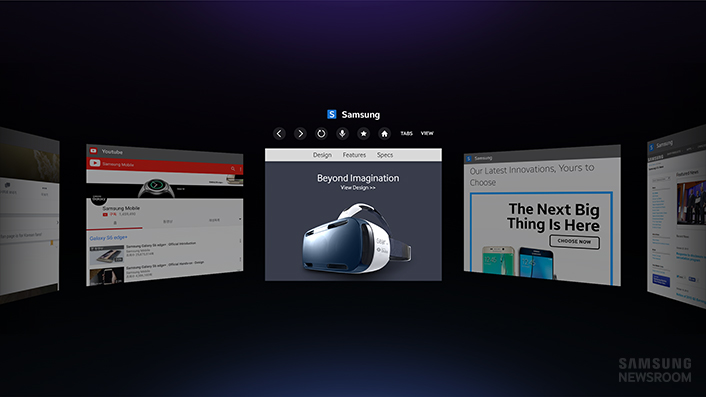
Samsung has announced a new browser designed for its virtual reality device, Gear VR. Internet for Gear VR is designed to enable users to browse the Web in a more immersive atmosphere without having to download VR content.
“As a pioneer in the mobile VR industry, Samsung has continually worked to provide our users with a fully immersive mobile experience in the evolving world of virtual reality,” said Chan-Woo Park, vice president of product strategy team, IT and mobile communications business at Samsung Electronics. “As the demand for 360-degree, immersive video content rapidly rises, Samsung Internet for Gear VR further enriches the VR content ecosystem for our consumers, setting an industry standard for the VR viewing experience.”
The browser supports 360-degree and 3D video streaming, HTML5 video, voice recognition, and an on-screen keyboard.
Cortana makes it into Microsoft’s Power BI
Microsoft is bringing its personal assistant Cortana to the enterprise. The company announced Power BI integration with Cortana designed to give businesses new insights into their data.
“By integrating with Power BI, Cortana now works seamlessly with custom business analytics solutions to enable anyone to get answers directly from their key business data,” wrote Patrick Baumgartner, principal program manager at Microsoft Power BI, in a blog post.
In addition, the company announced the Quick Insights feature for Power BI to provide automated discovery.
Carnegie Mellon looks to build educational software
Researchers from Carnegie Mellon University are building educational software designed to teach kids basic skills, without a teacher or classroom. The effort is a part of a US$15 million Global Learning XPRIZE competition for open-source software that help teach kids in East Africa basic literacy and mathematical skills.
“At Carnegie Mellon, we take pride in solving big problems, and the lack of formal school is a truly immense problem in many parts of the world,” said Jack Mostow, a research professor at CMU. “If we can develop educational technology to fill that gap, we can significantly improve the lives of the 250 million children who today can’t read, write or do basic math.”
Django release brings new features
The Django team released Django 1.9 yesterday, with a few major highlights. Django is an open-source foundation that supports the Django Web framework. Django 1.9 has some new features like performing actions after transaction commit, which helps with sending notification e-mails, creating queued tasks, or invalidating caches.
Django now offers password validation to prevent the implementation of weak passwords, and it also allows for running tests in parallel, where each process gets its own database. A full list of release notes is available here.
Hackers expose children’s information
A data breach on the digital toymaker VTech has exposed the data of 6.4 million children, and is being considered one of the largest hacks targeting children.
VTech noted that an unauthorized party accessed VTech customer data housed on its Learning Lodge app store database on Nov. 14. Learning Lodge allows customers to download apps, learning games, e-books and other educational content.
In a statement on its website, the company said that children’s profiles included only their name, gender and birthdate. Data was stolen from parents’ accounts as well, including names, mailing addresses, e-mail addresses, secret questions and answers for password retrieval, IP addresses, download histories and encrypted passwords. VTech also mentioned that the customer databases do not contain credit card information, nor is credit card information needed on the Learning Lodge website. The attack is being investigated.
The Forge is now with developers
Today an old-school software company called Autodesk unveiled its new cloud-based initiative, called Forge. Forge will accelerate a cloud-connected ecosystem in support of making new technologies.
The initiative includes three components: a Platform-as-a-Service offering, a developer program, and a US$100 million investment fund geared toward advancing the next generation of innovative technologies, according to the company’s announcement.
The Forge Initiative is designed help developers and innovators turn technology into connected, personalized experiences, and to help developers build new businesses.
Socketize wants to help developers build apps with no back-end code
Socketize is a way for developers to build fast, real-time apps with just JavaScript and no back-end code. Socketize became live in mid-November, and it already has a few demo apps that were created with no back-end code on its website.
Socketize has a WebSocket that developers can put into their application. It can push a message to the client from the server without the “hassle” of managing a WebSocket server and writing long client-side scripts, according to its website.
It also gives developers a NoSQL-like database in the cloud, which can directly access the database from the browser via WebSocket. All can be done via REST API, as well.





